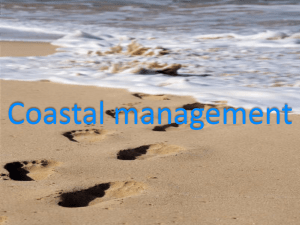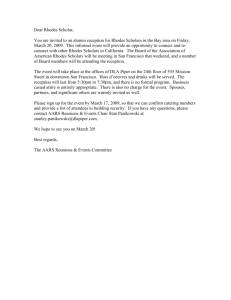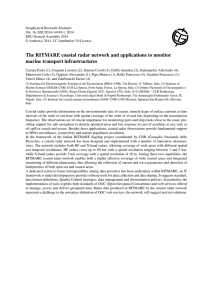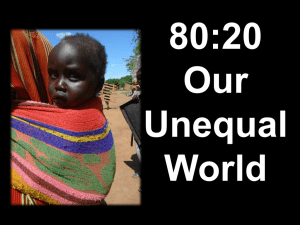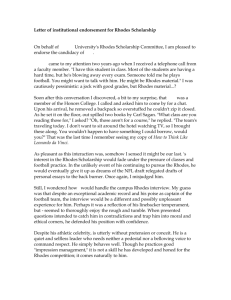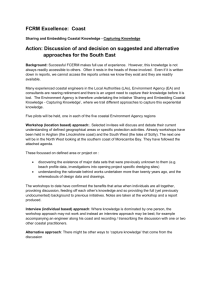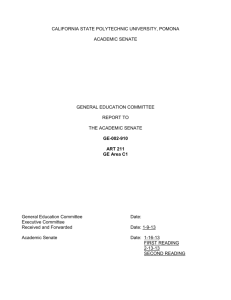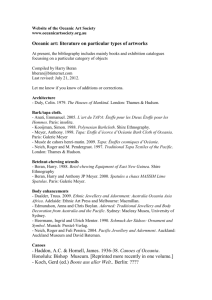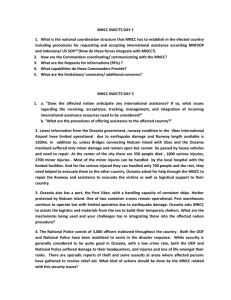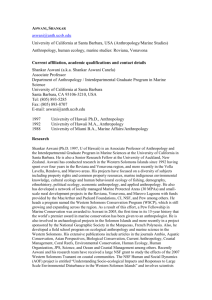POST-DOCTORAL position at Rhodes University in the Departments
advertisement
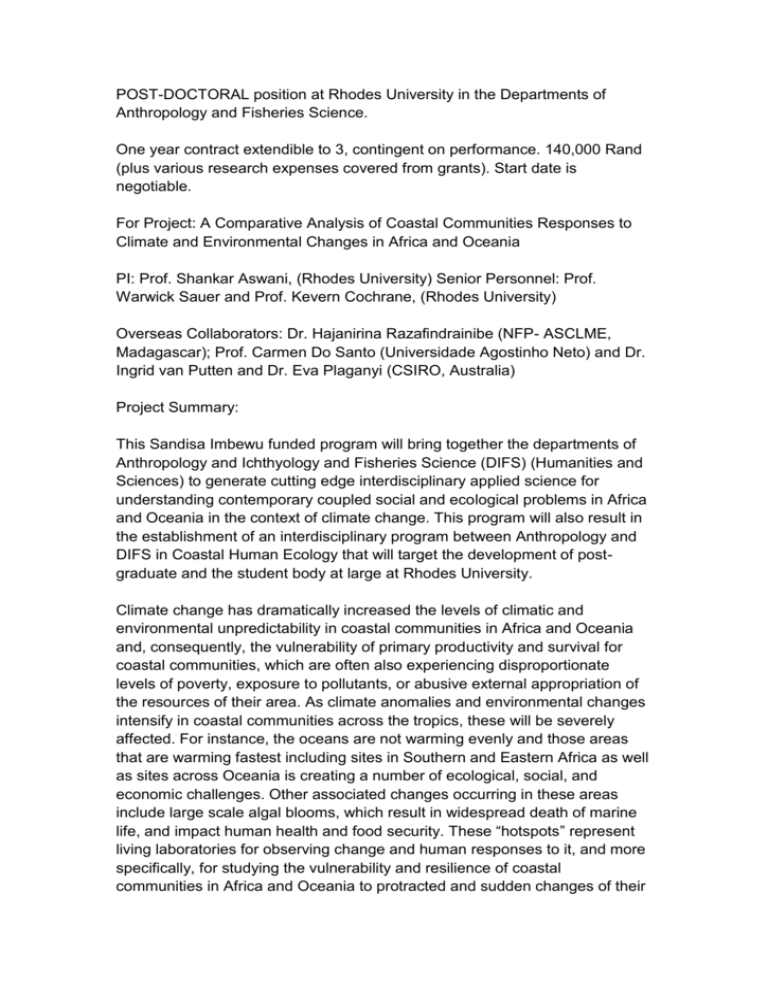
POST-DOCTORAL position at Rhodes University in the Departments of Anthropology and Fisheries Science. One year contract extendible to 3, contingent on performance. 140,000 Rand (plus various research expenses covered from grants). Start date is negotiable. For Project: A Comparative Analysis of Coastal Communities Responses to Climate and Environmental Changes in Africa and Oceania PI: Prof. Shankar Aswani, (Rhodes University) Senior Personnel: Prof. Warwick Sauer and Prof. Kevern Cochrane, (Rhodes University) Overseas Collaborators: Dr. Hajanirina Razafindrainibe (NFP- ASCLME, Madagascar); Prof. Carmen Do Santo (Universidade Agostinho Neto) and Dr. Ingrid van Putten and Dr. Eva Plaganyi (CSIRO, Australia) Project Summary: This Sandisa Imbewu funded program will bring together the departments of Anthropology and Ichthyology and Fisheries Science (DIFS) (Humanities and Sciences) to generate cutting edge interdisciplinary applied science for understanding contemporary coupled social and ecological problems in Africa and Oceania in the context of climate change. This program will also result in the establishment of an interdisciplinary program between Anthropology and DIFS in Coastal Human Ecology that will target the development of postgraduate and the student body at large at Rhodes University. Climate change has dramatically increased the levels of climatic and environmental unpredictability in coastal communities in Africa and Oceania and, consequently, the vulnerability of primary productivity and survival for coastal communities, which are often also experiencing disproportionate levels of poverty, exposure to pollutants, or abusive external appropriation of the resources of their area. As climate anomalies and environmental changes intensify in coastal communities across the tropics, these will be severely affected. For instance, the oceans are not warming evenly and those areas that are warming fastest including sites in Southern and Eastern Africa as well as sites across Oceania is creating a number of ecological, social, and economic challenges. Other associated changes occurring in these areas include large scale algal blooms, which result in widespread death of marine life, and impact human health and food security. These “hotspots” represent living laboratories for observing change and human responses to it, and more specifically, for studying the vulnerability and resilience of coastal communities in Africa and Oceania to protracted and sudden changes of their marine resources and associated livelihoods, as well as their concomitant adaptive responses in a cross- cultural and multi-sited geographical context. Such comparative knowledge can better assist us in developing theoretical models of human adaptations to a changing environment as well as providing applied options and management strategies that are contextually suitable, realistic, and achievable on the ground. This interdisciplinary research program led by Rhodes University in partnership with various African (Madagascar and Angola; [Mozambique-time and funds permitting]) and Australian institutions will study the vulnerability and resilience of coupled human-natural marine systems in selected sites in Africa and Oceania (Western Melanesia) as they face the local effects of global climate and environmental change. Within this cross-cultural context, hotspot sites experiencing changes such as massive algal blooms will be a point of reference for every community surveyed so that we can be confident of comparability and for gauging how communities in various parts of the world simultaneously cope with protracted and sudden environmental changes. More specifically, this interdisciplinary and multi-methods quantitative and qualitative research will: (1) measure the social and ecological effects of rapid and protracted environmental disruption on coastal communities, (2) identify local understanding of climate and environmental change and match these data to local scientific research, (3) assess the concomitant responses of coupled human and natural systems (to investigate system dynamics and feedbacks), (4) evaluate potential drivers of greater system vulnerability and resilience, (5) employ a Multi-scale Integrated Models of Ecosystem Services (MIMES) modelling package (as well as other MICE modelling tools currently being discussed at GULLS) to integrate all this data, develop a model of current ecosystem services lost, and simulate the daunting prospect of a “post climate change scenario” for marine resources, in which reefs are heavily damaged and people have to adapt to a very different marine environment, and (6) improve the capacity of African researchers and students as well as local communities in Africa and Oceania to predict and respond to current and future climate related changes. Required qualifications: We will consider candidates with natural and/or social science backgrounds, but it is imperative that the candidate has a strong quantitative and/or modelling background (able to use R stats software, etc.) Desirable qualification: Capacity to speak Portuguese and use of GIS Please email application letter, CV, and 1-2 published articles to: Shankar Aswani Professor Department of Anthropology Department of Ichthyology and Fisheries Science (DIFS) Rhodes University Grahamstown 6140 South Africa Telephone: +27 46 603 8231 Fax: +27 46 622 5570 s.aswani@ru.ac.za Web: http://www.ru.ac.za/anthropology/people/profshankaraswani/

